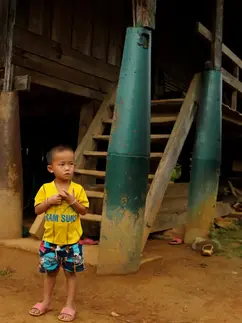The Hidden Weapon of War in Sudan: Period Poverty
Malika Knapp

It has been 15 months since fighting broke out between warring factions in the Sudanese capital of Khartoum. Since then, healthcare infrastructure has been obliterated, leaving 11 million internally displaced people with limited food, water and sanitation. Women and girls have an additional challenge to face - managing their menstrual cycles amidst a war zone.
What is period poverty and what are its causes?
According to the World Bank, 500 million women and girls globally have insufficient access to basic hygiene products and services. Bare essentials such as clean water, sanitary products and toilets are severely limited. This lack of affordability and access to sanitation products for menstruation is termed period poverty. Insufficient access to period products however is not the only cause of period poverty. Access to sanitation facilities, such as clean and private toilets, are also essential for ensuring the safety and dignity of women and girls.
How does conflict exacerbate period poverty?
Globally, wars are a major driver of period poverty, with women being disproportionately affected by armed conflict. In camps for internally displaced persons (IDPs), women are often forced to choose between buying essential items, like food for her family, or period products. Menstrual products are widely viewed as ‘luxury items’ in low-income countries, meaning women are often expected to make do without them. The lack of access to toilets and privacy for women and girls while menstruating further compounds the issue. This can be seen within shelters in Rafah, Gaza that have just one toilet per 486 people and two-hour reported wait times.
In Sudan, the conflict has significantly reduced the supply and affordability of sanitary pads available in pharmacies and supermarkets. Due to the price spike of sanitary pads, displaced women living in Sudan have resorted to unsafely managing their period. Many women have to create makeshift pads by cutting out pieces of tents or using old rags, which poses a serious risk of infection. Displacement due to the conflict has also exacerbated period poverty as women have been forced to flee under the threat of sexual violence. When doing so, they leave behind both their employment and ‘non-essential’ items such as menstrual products, further aggravating the cycle of poverty.
The stigma of menstruation
The stigma and shame so often associated with menstruation, particularly in African countries, further compounds the issue of period poverty in Sudan. This stigma largely stems from ingrained cultural norms and gender inequalities. Girls are commonly told their menstruating bodies are ‘dirty’ or ‘possessed,’ which instills the notion from a young age that periods are shameful. Furthermore, with widespread myths that menstruating women should be banished or not enter places of worship, women’s movements are also restricted and they are forcibly isolated from their families and communities.
Moreover, the taboo nature of menstruation means there is limited dialogue, ignorance and a lack of education around menstrual health hygiene among girls and boys. Because this issue is silenced, successful menstrual health policies cannot be implemented, as silence inhibits menstrual health hygiene from being seen as a top public health priority.
What are the impacts of period poverty on education and potential?
The consequences of the stigma surrounding menstruation also extends to girls’ education, as period poverty squanders the economic opportunities and potential of women. In large parts of the developing world, menstruation contributes to girls regularly skipping school or dropping out entirely. This is largely due to fear or embarrassment and a lack of the necessary facilities to manage their periods, such as private toilets. In Sub-Saharan Africa, girls are absent from 20% of the school year because of their periods, which places them a whopping 145 days behind their male peers. This has significant implications for girl’s future career opportunities as a lack of education is closely associated with poverty. Existing gender inequalities are therefore further perpetuated by period poverty. Menstrual hygiene management is thus essential for improving the economic development of communities in the Global South.
How to tackle period poverty?
Steps are being taken to overcome the detrimental impacts of period poverty globally. In Sudan, World Vision is seeking to combat period poverty. They have implemented an initiative which provides training and start-up kits that allow Sudanese women to produce an affordable alternative to sanitary pads. The program promotes menstrual hygiene education and awareness to dismantle taboos. It also aims to empower women by enabling them to earn an income and start their own businesses.
In order to tackle period poverty, the affordability and accessibility of menstrual products must be improved. The stigma of menstruation must also be addressed to ensure the dignity of women and girls. Ultimately, safe menstrual hygiene is a basic human right that is too often held at the mercy of geopolitics.
Malika is currently studying a double degree in International Relations and Medical Science at The Australian National University. Passionate about the intersection between global health, gender equality and geopolitics, she has volunteered for NGOs and nonprofits in Tanzania, Nepal and Cambodia focused on women’s empowerment and promoting youth political participation. She is a former Girls Run The World embassy program delegate and recipient of a New Colombo Plan Mobility Grant for a political economy study tour in Papua New Guinea. Malika will undertake an exchange semester at Stockholm University in September and in the future she aspires to work in the field of global health diplomacy and international development in South East Asia.

















Comments